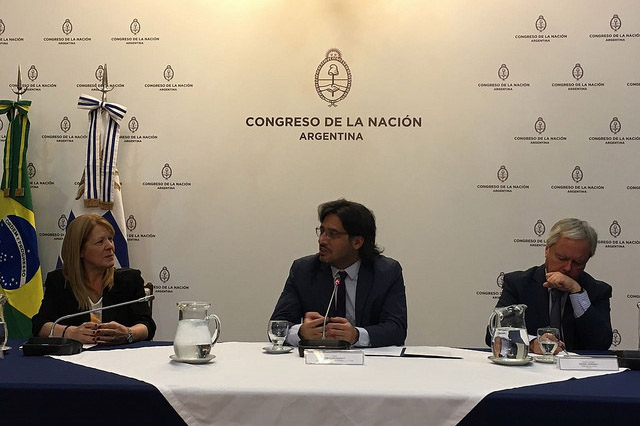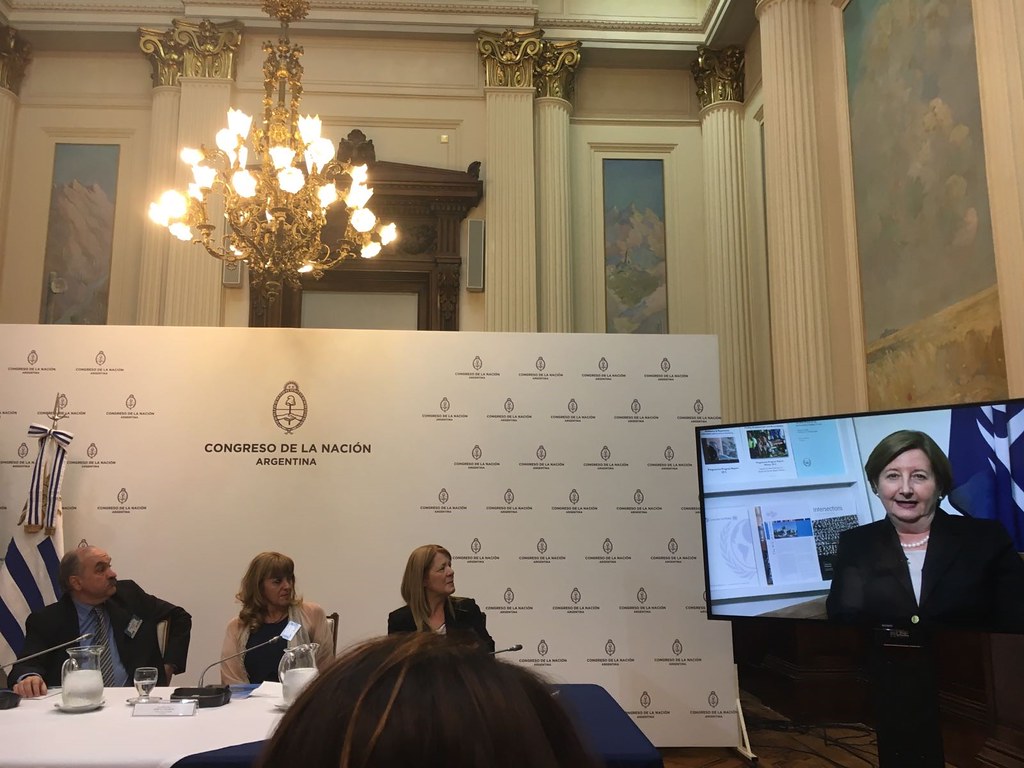
On 15 December 2016, Parliamentarians for Global Action (PGA), in collaboration with the Chamber of Deputies and Ministry of Justice and Human Rights of Argentina, organized a Conference on the justice system created by the Rome Statute of the International Criminal Court (ICC). The Conference, hosted by the Chamber of Deputies of Argentina in Buenos Aires, aimed at providing a platform for Argentinian officials from the executive, legislative and judiciary branches to exchange and deepen their knowledge about the ICC system and its role in fighting impunity for the most serious crimes of international concern.
The panelists of the Conference included ICC officials, high-level government officials of Argentina, as well as experts from academia and civil society. The Conference was chaired by Dip. Margarita Stolbizer, President of PGA. In her remarks, she highlighted the principle of complementarity, underlining that the ICC steps in only when national courts are unable or unwilling to do so.
She recalled that Argentina has been a victim of very cruel dictatorships that violated human rights and expressed her convictions that these crimes would have not have occurred if the ICC had been existent at that time. Moreover, she reaffirmed that the support to the ICC is a State policy in Argentina, since the different governments have advanced the ICC process in the country through the years.
The opening session was addressed by Dip. Patricia Gimenez, 2nd Vice-president of the Chamber of Deputies of Argentina, who stated her strong support to fight against impunity as a contribution to the prevention of new atrocities and to the promotion of peace. She also highlighted the importance of the recent signing of the voluntary agreement on cooperation related to witnesses’ protection between Argentina and the ICC.
Her remarks were followed by Vice-chancellor Pedro Raúl Villagra Delgado, Secretary of Foreign Affairs of Argentina who expressed his strong support to the ICC, referring to it as “one of the greatest achievements in the field of human rights and international law”. In this context, he explained the key role of Argentina in the negotiations of the Rome Statute and, while acknowledging the importance of the activation of jurisdiction of the ICC over the crime of aggression, committed to advancing process of ratification of the Kampala Amendments on the crime of aggression in Argentina.
Dr. Martín Casares, Under Secretary of Criminal Policy of the Ministry of Justice of Argentina, emphasized that the step taken by this government with the signature of the voluntary agreement on witness relocation is only a first step, as there is a commitment to continue supporting the work of the ICC through the signature of other cooperation agreements.
The first panel on challenges faced by the international community regarding impunity for the most serious international crimes was introduced by Dip. Cornelia Schmith Liermann, Chair of the PGA National Group in Argentina.
An expert presentation was delivered by Prof. Mónica Pinto, Dean of the Law School of Buenos Aires University, who recounted the history of International Criminal Law, the creation of the Ad Hoc tribunals by the UN Security Council, and the drafting history of the Rome Statute - which culminated with the creation of the first permanent international tribunal to prosecute international crimes.
The second panellist, Érica Lucero, representative of the Ministry of Foreign Affairs of Argentina in the Embassy in The Netherlands, introduced the principles of complementarity, non-retroactivity, and irrelevance of official capacity, to the audience, in addition to describing the situations and cases that the Court is currently investigating.
During the second panel on implementation of the Rome Statute at national level as a tool for the reinforcement of the domestic legal framework, Dr. Alejandro Kiss, legal officer at the ICC Chambers, provided an overview of the ICC jurisdiction, means of its activation and explained the limitations relating to its material, temporal and territorial aspect. While summing up the types and legal particularities of the definitions of genocide and crimes against humanity enshrined in the Rome Statute, he provided a very useful comparison of the provisions on these crimes under the statutes of other international tribunals, in particular the Charter of the International Military Tribunal in Nuremberg, Statute of the International Criminal Tribunal for the former Yugoslavia and Statute of the International Criminal Tribunal for Rwanda.
This presentation was followed by the expert presentation of Mr. Luciano Pezzano, Professor at the Cordoba Law School, who explained part of the Court's substantive competence: war crimes and the crime of aggression.
Based on the notion of International Humanitarian Law and its scope of application, it classified the seventy-four war crimes of Article 8 of the Rome Statute according to the armed conflict in which they can happen, emphasizing the different regulation of war crimes committed in the context of an international armed conflict and those committed during a non-international armed conflict. Based on the relationship of ius in bello with ius ad bellum, it went on to point out the main elements of the crime of aggression, as it has been received in Article 8 bis, highlighting its main characteristics and challenges.
The third panel on cooperation with the ICC and the contribution of the Rome Statute in strengthening judicial systems in the fight against impunity was addressed by Ms. Romina Morello, Legal Advisor of PGA, who, on the basis of practical examples, demonstrated why the cooperation with the ICC is indispensable and crucial to establishment of justice.
She drew a comparison between two cases - the one of Mr. Omar Al Bashir, President of Sudan, and of Mr. Jean- Pierre Bemba former Vice- President of Democratic Republic of Congo - which, as a result of the non-cooperation or cooperation of the States, led to diametrically opposite implications for rendering justice to victims by virtue of having the perpetrators brought to justice.
In her presentation, Ms. Morello further explained the sui generis system of cooperation established by the ICC, and the two-fold obligations of States as established under the Rome Statute- (i) obligation to fully cooperate and (ii) obligation to implement the necessary procedures to enable cooperation within the domestic legal framework. She also elaborated on the consequences of non-cooperation by States, which include, in particular, denial of access to justice to victims, hampering the deterrent effect of the ICC and, ultimately, increased financial costs incurred by the States associated with the protection the victims, witnesses and preservation of the evidence.
In the second part of the panel, Lic. Antonia Pereira de Sousa, ICC’s External Relations and Cooperation Adviser, raise awareness on the content of the voluntary agreements on cooperation as well as their importance to make possible the efficient functioning of the ICC. She also highlighted the current limited number of voluntary agreements on cooperation and the importance of more countries following the example of Argentina to sign agreements and to engage into negotiations with the ICC. Lic. Pereira de Sousa also emphasized on the opportunities that signing this type of agreements with the Court could mean for the country, especially regarding capacity-building and the strengthening of domestic justice systems.
During the last panel on the role of victims in the Rome Statute system, the audience benefited from the participation of Ms. Mariana Pena, Legal officer at Open Society for Justice Initiative, and Dr. Felipe Michelini, Member of the Board of Directors of the ICC Trust Fund for Victims. Ms. Pena highlighted that the Rome Statute created a unique system of victims` participation where the victims are neither plaintiffs nor civil parties, but are participating in the proceedings in an “ancillary way”.
She also highlighted the different role of the victims and of the Prosecutor as they both represent other interests. The Prosecutor represents interests of the community and in the case of the ICC- of the international community- which implies further scope of responsibilities. These extend further than the interests represented by victims, which are in particular determination of truth, historical reconstruction, with an ultimate impact on reconciliation of States and communities. In the second part of the panel, Dr. Michelini raised awareness on the important role of the victims in ICC proceedings as well on the reparations’ system created by the Rome Statute. He also explained the different mandate of the ICC Trust Fund for Victim and the important work that this institution is doing to enhance the reality of the communities affected by crimes that are under investigation by the ICC.
In the framework of the Conference, PGA also held several formal meetings with government officials of Argentina, during which avenues for further cooperation between Argentina and the ICC have been explored. Ms. Romina Morello, Legal Advisor of PGA and Ms. Antonia Pereira De Sousa, External Relations and Cooperation Officer at the ICC Registry, met with the Chief of Cabinet of the Under Secretary of the Ministry of Justice in charge of the Penitentiary System of Argentina. The meeting focused on signing of a voluntary agreement on cooperation on enforcement of sentences between Argentina and the ICC, during which the Under Secretary expressed his strong interest in proceeding with official negotiations at national level with the objective of signing the agreement.
During the meeting with the specialized Office of the Prosecution of Financial Investigations, the representatives of the Office committed to support the ICC in international networks of prosecutors as well as to maintain informal contact with the Court in order to facilitate the cooperation.
The Legal Advisor of PGA also met with the Director of Information and Investigations of the Institute of Public Policy on Human Rights of MERCOSUR in order to discuss the areas of future cooperation with PGA, which may relate to the consideration of a draft “reference-law” on cooperation with the ICC for MERCOSUR countries and raising awareness of the activities of the ICC.
The conference and the formal meetings resulted in the reaffirmation of the support for the ICC and advancement of political willingness regarding cooperation with the ICC. The commitments expressed by representatives of Argentinean institutions opened possibilities to further proceed with the negotiation and conclusion of voluntary agreements as well as adopting domestic legislation implementing the Rome Statute.


